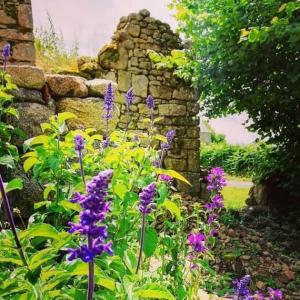We feel that the remains of an old farmhouse, right next to the tiny cottage, constitute to an important part of the charm of Les Pierres. It often gives rise to conversations about past and future, like a magical portal in time. Of course we regularly entertain the thought of rebuilding (when winning the lottery) and usually my desire to learn old-fashioned skills and techniques to be able to do it myself is part of that thought.
It’s also feels like a huge responsibility to take care of the ruin in a way that does justice to it’s magic. There’s a lot of maintenance to be done this year to prevent the walls from crumbling down even more. Summer is not the best time for that though, not just because of the temperatures but also because of the invasion of weeds and brambles.
In the meantime the stones (literally ‘Les Pierres’) form a sensational backdrop for the cottage garden we envision to create in time. We planted the Mealy Cup Sage (Salvia farinacea) last year. It’s not an edible sage, but nevertheless it’s attraction to pollinators and ornamental value makes it a strong and colorful presence.
The clustered bellflower (Campanula Glomerata) in the picture has the vernacular name of Dane’s Blood, in reference to an old English legend claiming this flower would grow on the sites of battles against the Danes. We’re Dutch, but close enough, I’d say.
A Sensational Backdrop For The Cottage Garden We Envision
Trying to make ones life sustainable is more than a personal choice and almost automatically leads to a multitude of decisions you have never even thought of before. On this website we share what works for us, or woefully no longer works, obviously without claiming the same for you.
We hope that our journey towards a supplementary comprehensive celebration of nature’s beauty might just clear a pathway forward for you too, perhaps challenges a revealing reconsideration, or simply provides for an equally indispensable diversion.
Can we change the world through food? We believe we can and we support Slow Food, a global movement of local communities and activists across more than 160 countries. Together we defend cultural and biological diversity, promote food education and the transfer of traditional knowledge and skills.


